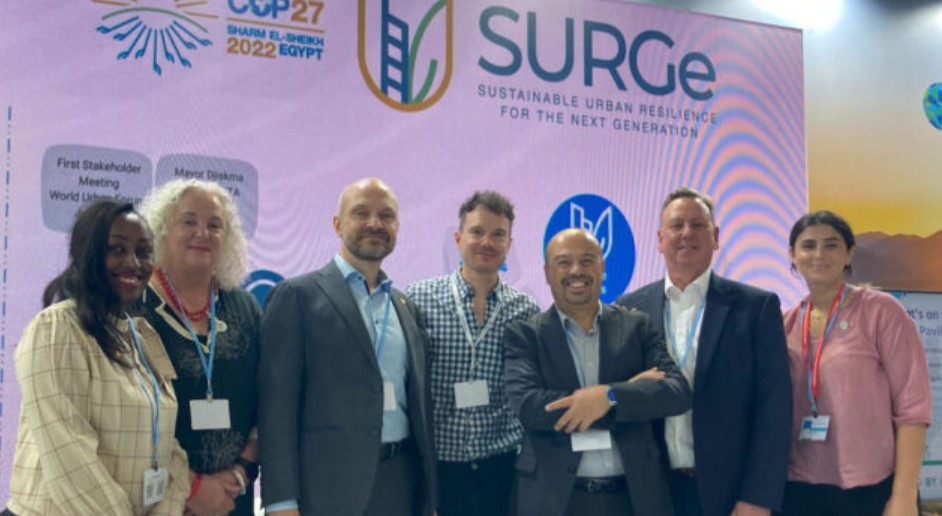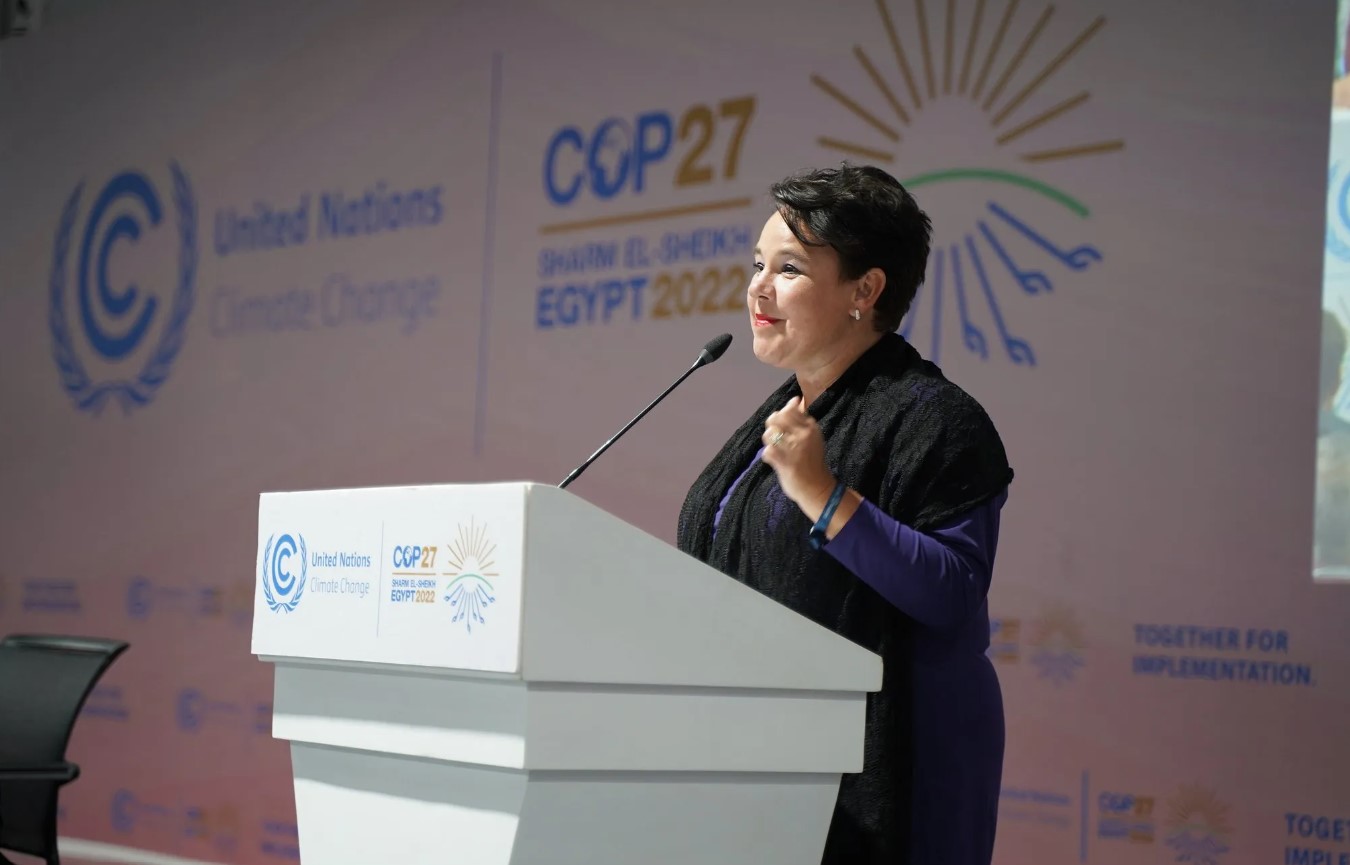
Since COP27 wound down late last year (November 6-18), much of the post event commentary has centered on the fact that as observed by The Conversation, the gathering “failed to go beyond the 2021 Glasgow climate pact’s promise to phase down unabated coal power (and) announced no new targets or commitments” tied to reducing greenhouse gases.
Notwithstanding that shortfall, the media also highlighted one positive outcome from the event: the creation of the long-awaited Loss and Damage Fund initiative, whereby the world’s wealthiest countries have agreed to provide financial assistance for the most vulnerable countries impacted by climate change.
Flying below the media’s radar in all of this was the COP27 presidency’s formal launch of the SURGe Initiative (Sustainable Urban Resilience for the next Generation). SURGe is designed to facilitate better multi-level collaboration on five key fronts (Buildings and Housing, Urban Energy, Urban Waste and Consumption, Urban Mobility and Urban Water); and over the coming years, has the potential to become one of the most impactful, transformative initiatives tied to making cities more resilient. An initiative which could also significantly reduce the carbon footprint of cities, which according to the World Bank, now account for over 70 percent of global emissions.
Commenting on the five key tracks of SURGe, Dublin Councillor Alison Gilliland observes that “when you think of cities or larger urban areas, they do describe that ecosystem. Cities are living entities… people move around, they work, they live and those five areas interact with each other… and I anticipate that the working groups will be very conscious of that interaction.” She added that she is hopeful that the LGMA constituency can be part of those working groups.
Gilliland is certainly more than qualified to weigh in on the tremendous potential SURGe has for LGMAs, in light of her capacity as an experienced municipal politician (both councillor and the mayor of Dublin from June 2021 to June of 2022), and as the Deputy Head of the European Committee of the Regions delegation for the most recent COP.
“I think SURGe will really bring (local government representatives) together so that we can be that practical voice on the ground that can influence a debate and the discussion… that in turn helps to influence the outcome of COP28.” Influence she is quick to add, that is far less likely to occur unless ministerial meetings (between LGMAs and federal ministers) such as the ground-breaking one conducted at COP27 become a formal part of the process.
“As Mayor Dijksman (Mayor of Utrecht) said (during COP27), if we can urge the UNFCCC… to use the ministerial and climate urbanization (as a platform for multi-level dialogue) and bring it forward and incorporate it into (future) COPs,” then she predicts “the viewpoints of LGMAs and their peers “will filter up.”

Apart from a “vertical” multi-level dialogue tied to identifying and prioritizing SURGe action items, Gilliland says a ‘horizontal’ knowledge exchange will be a critical part of this process as well. “It’s not just the LGMA constituency… it is NGOs, semi states, women’s groups, youth groups and everyday individuals… we’re all in this together.”
Although the Government of Ireland has yet to formally endorse SURGe, Gilliland’s federal peer Eamon Ryan – the Irish Minister of Environment, Climate, Communications and Transport, says he personally supports the initiative and is a firm believer that “everyone needs to be involved” in discussions surrounding putting plans in place to fight climate change, “otherwise we will have a real problem.”
Ryan is convinced that “we have to include cities and initiatives like SURGe within COP or any other multilateral process” because when it comes to the disastrous effects of climate change “cities are on the front lines.” It’s a conviction he feels so strongly about (perhaps in part because his political career began in the early 2000s’ as a Dublin council member) that this year he says “I’m going round to every council… every local chamber and sitting down… right across the country. So local communities, public meetings, community groups, national, local climate dialogues, where we sit down and listen.”
During COP27 Ryan was actively involved as the lead EU Minister in discussions that culminated in the creation of the Loss and Damage Fund. A fund which on the surface may seem more tied to urban resilience, versus SURGe’s focus, which some may argue is more about mitigation. However Ryan is convinced that “it’s all interconnected. The more mitigation of climate we do, the less adaptation we’ll have to do. The more adaptation we do, the less loss and damage we’ll have to do.”
One example Ryan cites are efforts to green a city and such initiatives as protecting urban forests and expanding the canopies of cities. “As well as being a mitigation element… it has big adaptation benefits. Those trees reduce the amount of heat, protect water systems and they reduce loss and damage (so) you have huge health benefits when you green a city,” he observes.
With the Global North now responsible for over 90 percent of carbon emissions, there’s a compelling argument for LGMA’s to use SURGe in partnership with other levels of government and also the private sector, towards achieving carbon neutrality sooner (in the case of several EU cities… by 2030). In fact the EU is already moving in that direction.
In the case of the European Committee of the Regions, Gilliland says that moving forward “all local and regional authorities will be required to detail their local and regional determined contributions, their own climate targets… (which) is a really good way of being accountable and transparent.” She adds that “I think it’s also very positive for national governments that they can see at a glance across their country where the various cities and regions are at and who needs help and where,” with regard to identifying and fast-tracking projects.
However due to longstanding capital constraints associated with climate change initiatives in favor of other government priorities, LGMAs will still need to prioritize Gilliland opines. “Finance obviously is a big part of the tension. It was the key tension at COP27 (but) I think we got a reasonable outcome… particularly for the Loss and Damage (initiative). But we also have to work with private capital… that’s where we can develop really positive public private partnerships (and) green procurement projects.”
No doubt tied to the first-hand experience both Gilliland and Ryan have had at the local level, even with improved dialogue and funding in place, yet another very real obstacle for initiatives such as SURGe is public buy in for green projects.
Gilliland says she is witnessing public resistance in her own municipality, which is in the process of creating 60 km of protected bike lanes by 2024. “Dublin is an old city with narrow streets… and we’re trying to pedestrianize more streets,” while at the same time tackling the aforementioned bike infrastructure, all the while continuing to accommodate vehicular traffic. Against that backdrop, the overarching challenge that remains she says is “we’re still finding it difficult to get people out of cars and onto public transport.”
From Ryan’s perspective the most difficult challenge, apart from funding for the type of projects spotlighted by SURGe, is that when it comes to dealing with the general public there is a need to… as he puts it… “hasten slowly” rather than pushing through a “panicky quick” sky is falling perspective. At the same time, “we need (to promote) a story that appeals to people’s emotional instincts (and foster) a sense of protecting… not just the planet but protecting your home.” A sense of home he says that people can interpret as meaning any one or combination of: your personal property, the street you live on, your neighbourhood or city of residence.
That kind of narrative is something he says truly resonated with him during COP27 when meeting with counterparts from Pakistan… a country that was ravished in 2022 by devastating floods. “I was really moved by ministers from the low-lying islands (and) the narrative around protecting your home,” he recalls, adding that for the residents of that country, “the destruction of their homes was not abstract, but very real.”
In the wake of such disasters and in anticipation of increasingly frequent “100 year storms,” initiatives such as the Loss and Damage Fund and SURGe could play a pivotal role in helping less advantaged countries to better cope with climate change – while at the same time… stopping if not reversing the world’s year over year increase in CO2 emissions.
This article originally appeared on TalkoftheCities.ICLEI.org.
Mark Wessel is an urban journalist and public speaker who profiles unique city initiatives tied to sustainability, resiliency and quality of living.






